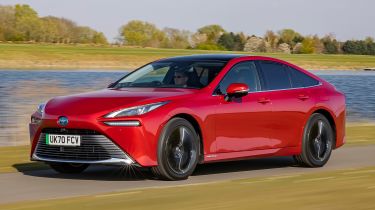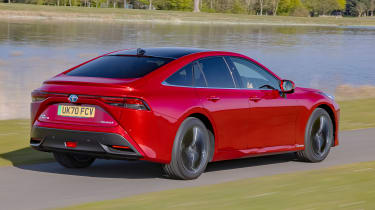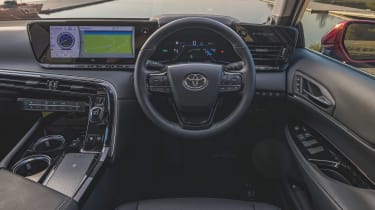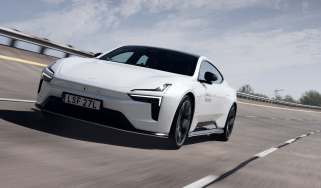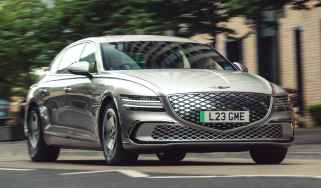New Toyota Mirai 2021 review
We get behind the wheel of the second-generation Toyota Mirai hydrogen fuel cell car

Verdict
Toyota has learned a great deal about fuel cell cars since the first Mirai was released back in 2014 - and it shows. The new model is improved in pretty much every measurable way, and most subjective ones, too. While limited refuelling options, a cramped interior and a high purchase price mean the Mirai won’t be for everyone, it’s a rolling proof of concept that shows hydrogen will play a big part in a zero-emission future - just maybe not for passenger cars.
Dare to search out the type of pub monologue given by a person with the confidence only a few drinks can bring, and you’ll hear that the future of motoring isn’t in electric vehicles, but hydrogen.
Here, then, is the all new Toyota Mirai, powered by that very fuel that’s seemingly always been on the cusp of the mainstream. It’s the sleeker, more handsome second-generation model of the brand’s hydrogen fuel cell car, and it proves that the world’s most abundant element can play a huge part in our zero-emission future - just not necessarily for cars.
Let’s start with how the Mirai works, because this is still, in essence, an EV. A fuel cell works by passing hydrogen across an anode, which splits the atoms into protons and electrons. The electrons then pass through a circuit to generate a flow of electricity, which in turn charges a small lithium-ion battery that, like a regular EV, drives an electric motor.
Used - available now

2023 Ford
Kuga
22,498 milesManualPetrol1.5L
Cash £21,749
2023 Hyundai
Bayon
20,015 milesManualPetrol1.0L
Cash £12,649
2024 BMW
2 Series Gran Coupe
3,715 milesAutomaticPetrol1.5L
Cash £24,099
2023 Kia
Sportage
19,390 milesManualPetrol1.6L
Cash £20,649A clever chemical reaction that sees hydrogen react with oxygen from the atmosphere means the only byproduct is water, as a puff of vapour from the exhaust.
All of this magic happens under the Mirai’s long bonnet. Advancements in the tech since the first-gen car was launched mean that the fuel cell is 50 per cent lighter and physically smaller, yet it makes 12 per cent more power, so the Mirai’s motor now generates 180bhp.
Progress in the Mirai is serene. A nine-second 0-62mph time is a world away from the mind-bending speed of some EVs, but the acceleration feels smooth and linear. Put your foot to the floor, and there is a slight delay before the Mirai jumps ahead, a process accompanied by a sci-fi hum that’s distinct from any other pure-electric car.
The Mirai is set up for a relaxing drive, but that’s not to say it feels stodgy. The ride is forgiving - even on top spec Design Premium Pack trim’s 20-inch wheels - yet the car is neatly balanced front to rear, so it feels stable and predictable. At speed, the only obvious noise is the subdued tyre roar.
So what are the benefits of hydrogen as a fuel source? Well mile-for-mile, it’s significantly lighter than a battery. Whereas a Tesla Model S promises 390 miles from a battery weighing roughly 500kg, the hydrogen that fills the Mirai’s tank weighs just 5.6kg and will carry you for an official range of 400 miles. It means that, overall, the Mirai tips the scales at 1,900kg - on par with a combustion vehicle of a similar size.
Toyota says that the Mirai consumes 0.89kg of hydrogen every 62 miles; in the UK, a refill costs about £10 per kg. Our test drive covered more enthusiastic driving than most will subject it to, and the Mirai consumed 1.17kg per 62 miles - equating to about £56 for a 300-mile real world range. That’s a similar cost to a petrol car achieving 32mpg.
Of course, filling a hydrogen car represents a stumbling block for the technology. While EV charge points continue to pop up at a relentless pace, the total number of hydrogen filling stations in the UK stands at 14. There are a couple of big stations under construction, but the fuel is definitely more scarce.
To create hydrogen, it needs to be separated from water via electrolysis, compressed and liquified and, if this process isn’t done on-site, transported to a refuelling station, where the fuel cell then uses more energy to generate its electrical charge, so it’s not the most energy-efficient process.
A full EV effectively skips the admin, taking electricity from the national grid. Of course, there are other factors, such as the sourcing of raw materials, but fuel cell vehicles still need lithium, too.
And while 5.6kg of hydrogen goes a long way, packaging the tanks needed is tricky. The Mirai has three. The largest is mounted within the spine of the car in the floor, which creates a high central tunnel inside. Further tanks are located fore and aft of that, squeezing the cabin from either end. As a result, rear legroom is barely any better than most superminis, and the boot offers just 321 litres - this in a car with a similar footprint to an Audi A7.
Otherwise, the cabin is well-finished and packed with tech. There’s a huge infotainment screen, a digital instrument panel and a 10.1-inch head-up display. All four seats are heated and cooled, while back-seat occupants get a fold-down centre armrest that houses controls for entertainment and climate functions.
Despite being more powerful, more luxurious and better equipped than before, prices now start from £49,995 - the best part of ten grand less than the first Mirai. This top spec Design Premium Pack costs £64,995. That’s still strong money for the performance, but there’s always a price to pay for being an early adopter.
By Toyota’s own admission, the Mirai is essentially a rolling research lab. It proves the tech works, though its finest application is unlikely to be in cars, but in commercial vehicles. Refuelling stations can be built at transport depots topping up lorries and buses at a speed and with a range that - currently - lithium-ion batteries just can’t compete with. The weight saving of hydrogen relative to a big battery is already significant in a car - it would be enormous once expanded to the size of an HGV.
| Model: | Toyota Mirai Design Premium Pack |
| Price: | £64,995 |
| Engine: | Single electric motor |
| Energy store: | Polymer electrolyte fuel cell plus lithium ion battery |
| Power/torque: | 180bhp/300Nm |
| Transmission: | Single speed, rear-wheel drive |
| 0-62mph: | 9.0 seconds |
| Top speed: | 108mph |
| Range: | 400 miles |
| On sale: | Now |

